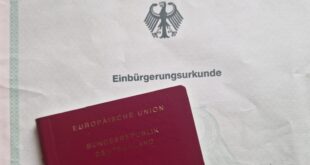Around 168,500 people were granted German citizenship in 2022 – an increase of 28 percent compared to the previous year, the Federal Statistical Office in Wiesbaden has reported. It’s the highest number of people who applied for and were granted German nationality in a single year in the past two decades.
Syrian nationals accounted for the largest share of naturalisations with around 48,300 people. Of these, around 13,900 were able to acquire German citizenship after only six years of living in Germany due to “special integration achievements”. Many of the Syrians who came to Germany between 2014 and 2016 to seek protection have now met the requirements for naturalisation.
Another reason for the increase in naturalisation figures is the increase of Ukrainian applicants. In 2021, there were around 1,900 naturalisations of Ukrainians, in 2022 there were around 5,600.
The most common countries of origin of naturalised persons in 2022 were:
- Syria: Around 48,300 naturalisations (plus 153 per cent compared to the previous year).
- Turkey: Around 14,200 naturalisations (plus 16 per cent)
- Iraq: around 6,800 naturalisations (plus 54 per cent)
- Ukraine: Around 5,600 naturalisations (plus 191 per cent)
Between 2000 and 2022, a total of more than 2.87 million people were naturalised in Germany.
At the end of 2022, according to the Central Register of Foreigners (AZR), there were around 5.3 million people who met the criteria for naturalisation. However, only 168,500 people were naturalised. The “exhausted naturalisation potential” is therefore only around 3.1 per cent.
Currently, the requirements for naturalisation include language skills, a secure income and a minimum of eight years of residency in Germany. Exceptions to these requirements are granted on certain conditions. People who want to become German citizens must also pass a written test in German consisting of 33 questions on German society and law. Moreover, applicants must make a commitment to the German liberal democratic order.
Many rights in Germany are tied to the possession of German passport. For example, only German citizens are entitled to vote at federal elections.
Femi Awoniyi
 THE AFRICAN COURIER. Reporting Africa and its Diaspora! The African Courier is an international magazine published in Germany to report on Africa and the Diaspora African experience. The first issue of the bimonthly magazine appeared on the newsstands on 15 February 1998. The African Courier is a communication forum for European-African political, economic and cultural exchanges, and a voice for Africa in Europe.
THE AFRICAN COURIER. Reporting Africa and its Diaspora! The African Courier is an international magazine published in Germany to report on Africa and the Diaspora African experience. The first issue of the bimonthly magazine appeared on the newsstands on 15 February 1998. The African Courier is a communication forum for European-African political, economic and cultural exchanges, and a voice for Africa in Europe.






























